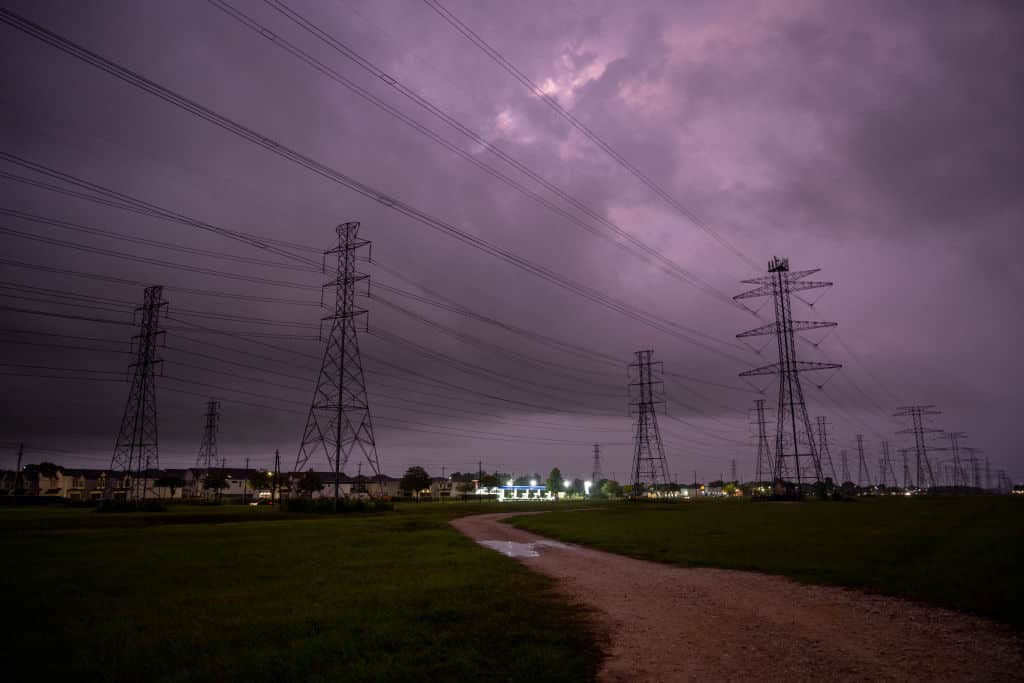Lights Go Out as Texas Meteorologist Warns of Strain on Power Grid

 Why you can trust us
Why you can trust us
Founded in 2005 as an Ohio-based environmental newspaper, EcoWatch is a digital platform dedicated to publishing quality, science-based content on environmental issues, causes, and solutions.
It’s a common joke that the weather report is always wrong, but a Texas meteorologist had the opposite experience last Wednesday when reporting on an ongoing heat wave.
During a 3 p.m. broadcast, KTRK in Houston meteorologist Travis Herzog warned about how the high temperatures could impact the power grid.
“When you get this kind of heat over major populations, you get a big draw on that electric demand,” he said in a video clip posted on Twitter.
At that moment, the station lights went out.
Herzog continued to report on “excessive heat,” with a temperature reading of 105 degrees Fahrenheit in College Station, Texas, when the lights went on again.
The same thing happened during Herzog’s 5 p.m. broadcast as he was forecasting highs above 100 degrees Fahrenheit west of Houston for last Thursday.
“Maybe it’s just my electrifying personality, maybe not. But this time I was fully expecting Ashton Kutcher to come around the corner and say, ‘You’ve been PUNKED!’” Herzog wrote on Twitter when he shared the second video.
Later, Herzog explained exactly what had happened.
“Mystery solved,” he tweeted. “One of our engineers informed me we went off the grid a little after 3PM. The studio lights aren’t on a dedicated backup power source, so they went off as we switched generator power. Two hours later we went off generator and on the grid and the process repeated.”
The incident brought a moment or two of levity to what is in fact a very serious example of the climate crisis in action. Texas is in the midst of a record-breaking heat wave, The Washington Post reported. Temperatures in Houston hit 105 degrees last Sunday, a record for July. On the same day, College Station experienced its second-hottest day ever with a high of 111 degrees Fahrenheit. The city of San Antonio has seen temperatures of 100 degrees Fahrenheit or higher for a record 35 days this year.
All of this high heat is putting pressure on the Texas power grid and bringing back memories of a blackout during extreme cold weather in 2021 that led to more than 200 deaths.
Before noon last Wednesday, the Electric Reliability Council of Texas (ERCT) sent out a message asking people to conserve energy by increasing thermostats and refraining from using large appliances between 2 p.m. and 9 p.m. that day, as ABC 13 reported. It was the second such appeal in three days.
“We can all help protect our critical infrastructure by doing our part,” ERCOT tweeted.
ERCOT–which provides power for more than 26 million people–took emergency steps later the same day to avoid rolling blackouts, Reuters reported.
“They were pulling a lot of levers to avoid going into emergency operations and rolling blackouts,” Stoic Energy LLC president of consultants Doug Lewin said, as Reuters reported.
No relief is in sight for Texas and other central states like Oklahoma and Kansas, which are predicted to see temperatures between 102 and 110 degrees Fahrenheit this week, The Washington Post reported.
“While mid to late July is the warmest time of year for the central U.S, many will likely see well above-normal temperatures for a long stretch,” The Midwestern Regional Climate Center tweeted.
The climate crisis is making heat waves more frequent and extreme. In the last 10 years, the continental U.S. has seen daily record highs twice as often as record lows. Summers are also growing both hotter and longer, according to The Washington Post.
Subscribe to get exclusive updates in our daily newsletter!
By signing up, you agree to the Terms of Use and Privacy Policy & to receive electronic communications from EcoWatch Media Group, which may include marketing promotions, advertisements and sponsored content.

 233k
233k  41k
41k  Subscribe
Subscribe 




